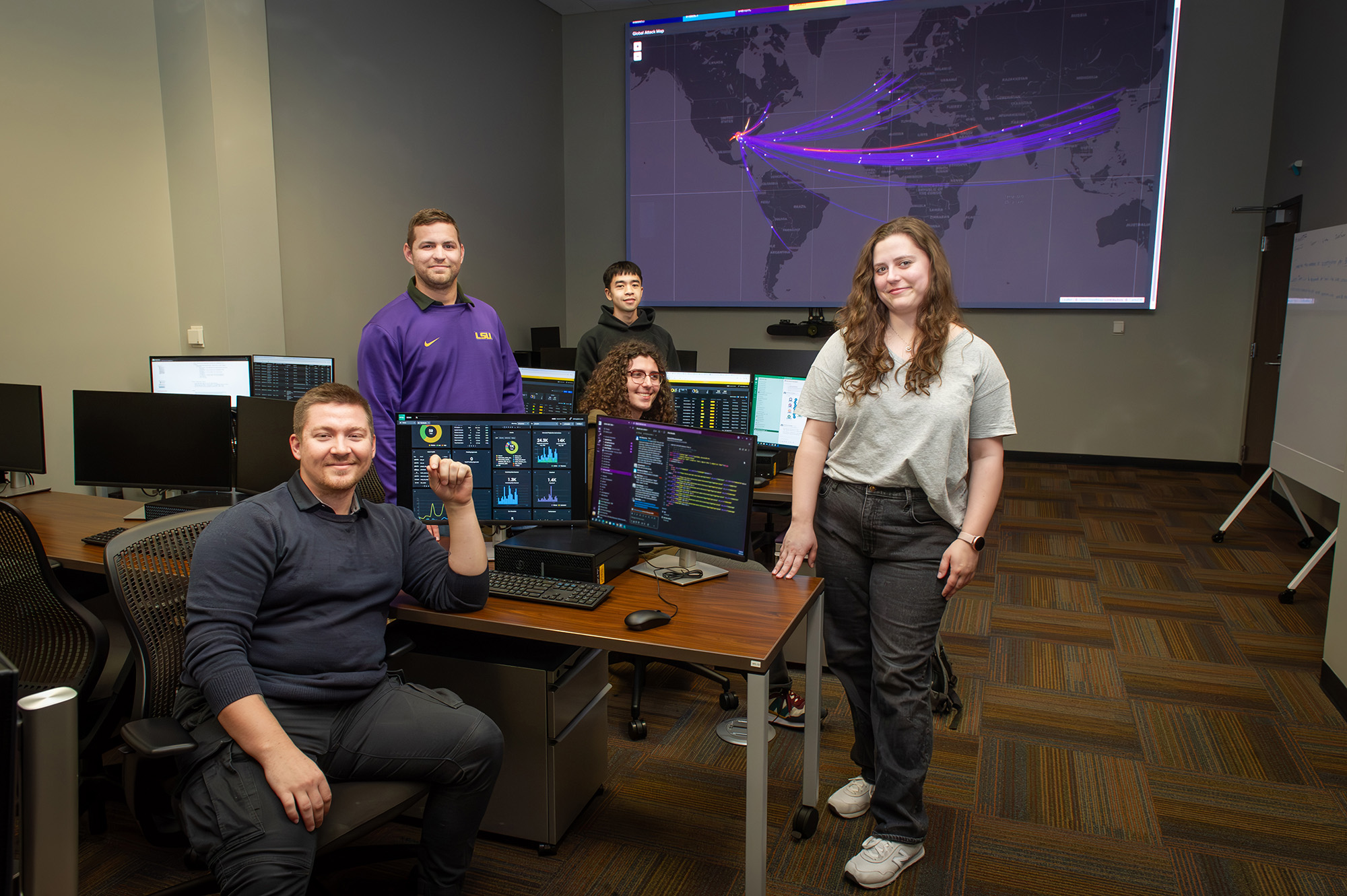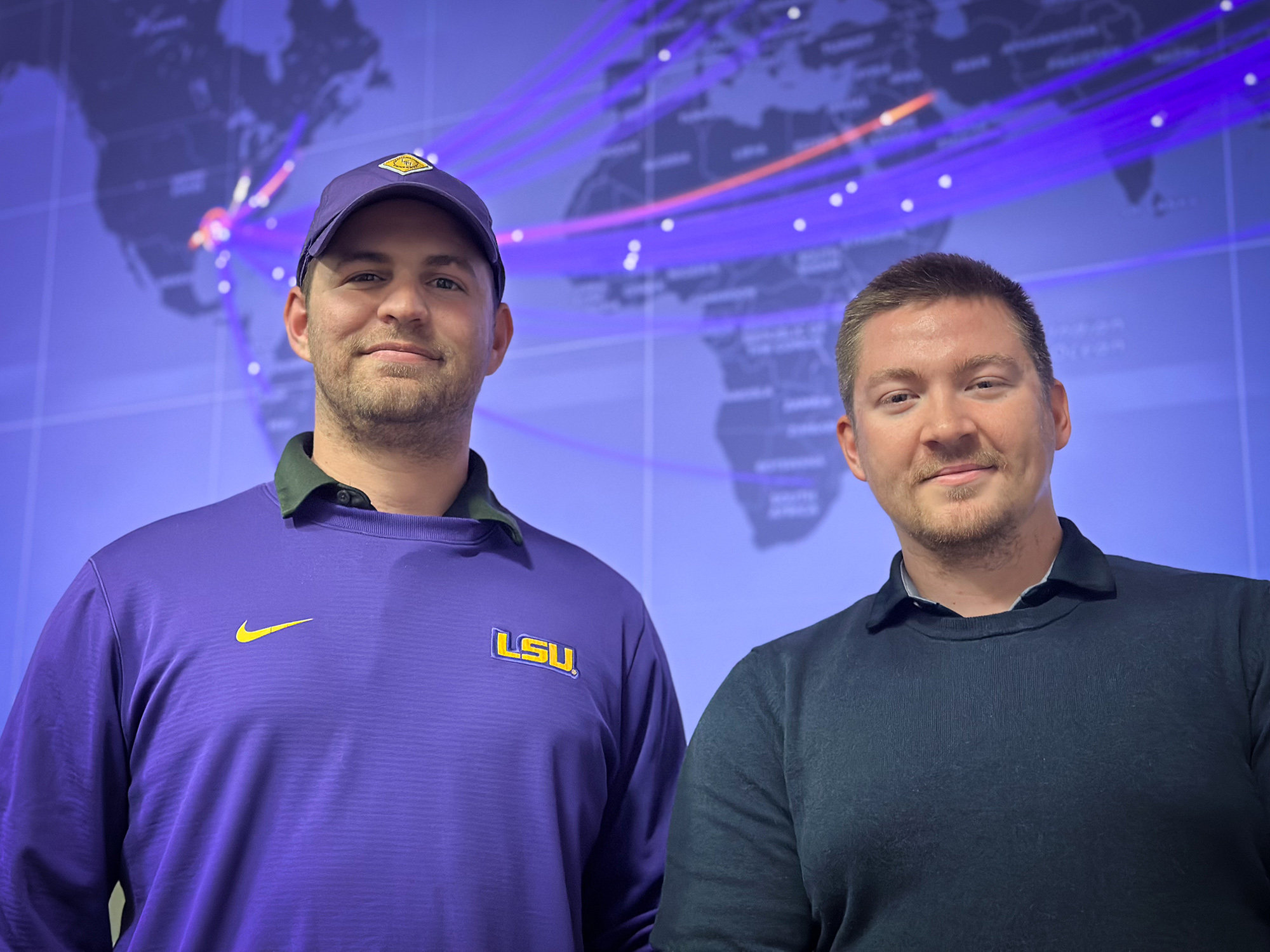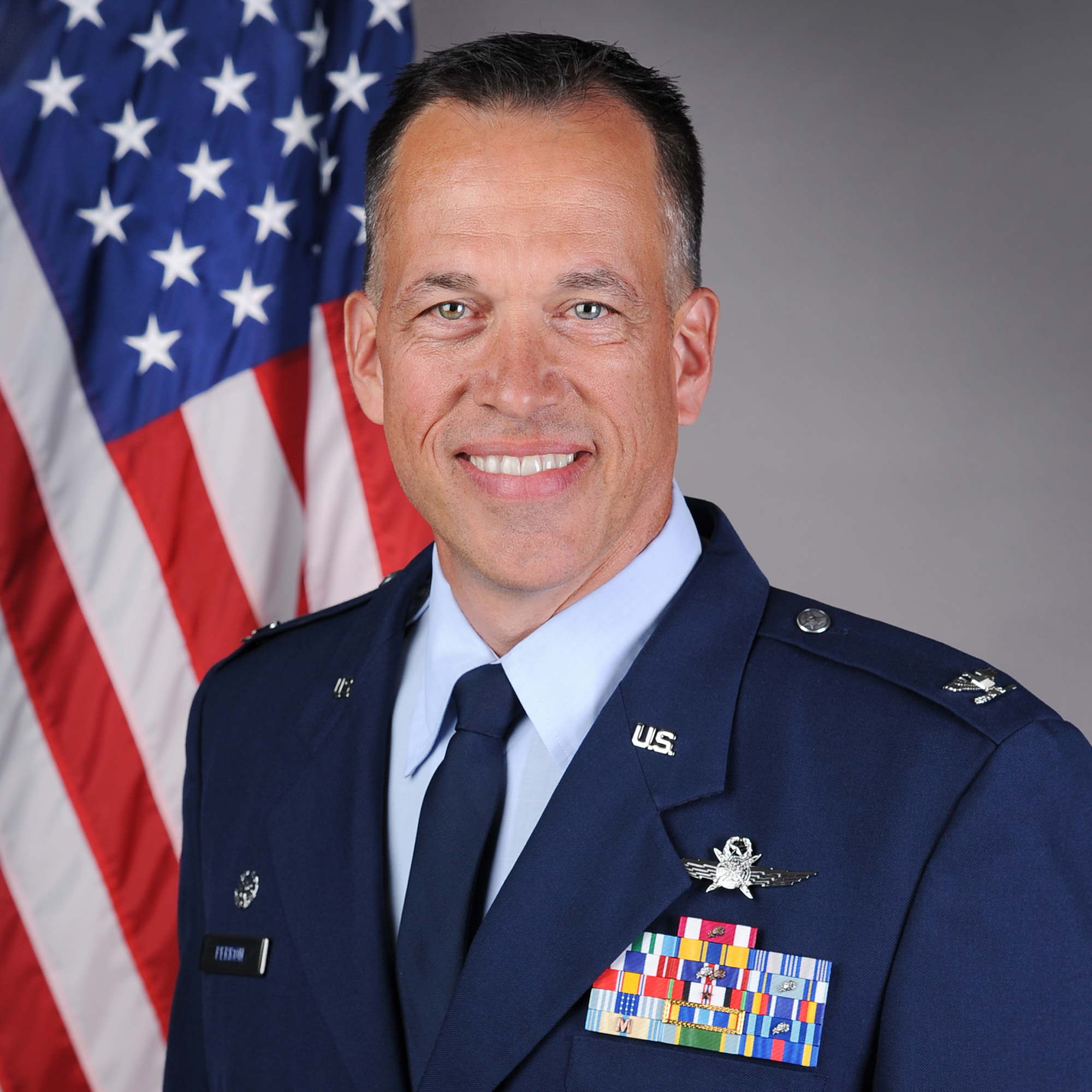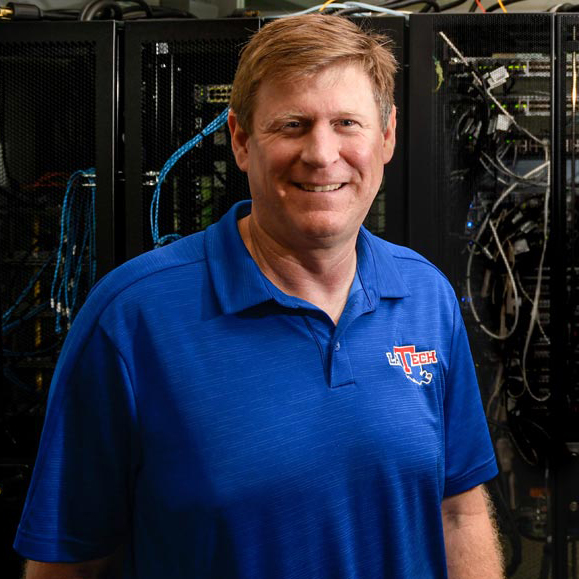Fighting for Their ‘Home Team’ on the Ground and in Cyberspace
Micah Champagne and Easton Kling are LSU cybersecurity students who serve in the Louisiana Army National Guard and work in LSU’s Security Operations Center to protect all colleges and universities in Louisiana from cyberattacks.

Easton Kling, Micah Champagne, Ellen Hoffman, Spencer Malone and Timmy Tran are LSU College of Engineering students who work in LSU’s Security Operations Center to protect higher education institutions in Louisiana against cyber threats. In working side by side with LSU industry partner TekStream, the students are investigating and responding to more than 2,000 cyber incidents per month.
– Elsa Hahne/LSU
They both grew up in Gonzales, Louisiana, the “jambalaya capital of the world,” but never met. Then, as adults, they ended up defending their state and nation together on two fronts. First with the Louisiana Army National Guard, including a nine-month deployment in the Middle East where they served in the same unit, and now through the LSU Security Operations Center, or SOC, protecting not just LSU but universities and colleges across the state from cyberattacks.
Micah Champagne and Easton Kling are computer science seniors who will be graduating this year. They both chose LSU’s cybersecurity concentration independently, but are now “best friends.” At least according to Kling, who used to call Champagne “Sergeant.”
“Working in the SOC is absolutely in alignment with my experience in the guard,” Kling said. “It’s about the way you conduct business. You’re a custodian of sensitive information that could be damaging to your organization if it left your area of operation, so you have to pay attention. But here, it’s not life or death, and you’re not covered in sand all the time.”
LSU’s SOC works to protect higher education in Louisiana by detecting and resolving cyber threats to universities while providing cyber experience to the students who work there. The SOC was announced last year and opened in October. The extension of LSU’s nation-leading SOC model is enabled by LONI, Louisiana’s shared fiber-optic network that connects almost all of higher education in the state. While the initially ambitious aim was to onboard 31 schools in less than two years, LSU and industry partner TekStream, which helps train students and tackles cyber threats alongside them, are working faster than expected with support from the state. LSU and Louisiana’s SOC is now expected to protect as many as 40 institutions by 2025.

Micah Champagne and Easton Kling are computer science seniors from Gonzales, Louisiana, who defend the state and nation together as part of the Louisiana National Guard and also as cybersecurity analysts in the LSU Security Operations Center, protecting not just LSU but universities and colleges across the state from cyberattacks. Compared to being deployed to the Middle East, Kling said, “It’s not life or death, and you’re not covered in sand all the time.”
– Elsa Hahne/LSU
Just like Champagne and Kling straddle military service and cybersecurity, so does the defense priority of LSU’s Scholarship First Agenda to secure Louisiana’s future. The National Security Agency, or NSA, long ago recognized cybersecurity as the new frontier in American defense. It bestowed on LSU its most technical designation as a National Center of Academic Excellence in Cyber Operations in 2022, now held by 21 schools nationally.
“It was going into the Army and doing satellite communications and network operations that I realized I had a love for cybersecurity,” Champagne said. “Once I came back from deployment and learned about LSU’s cybersecurity concentration, I immediately went to that. And then my professor last semester, Darrell Miller [formerly with the Louisiana State Police Cyber Crime Unit], told me about the SOC, which is an amazing opportunity to get the real-world experience you need on the outside after you graduate. Honestly, I don’t think any other university in the country has an opportunity like this at this point.”
But word of LSU’s and Louisiana’s success is getting out, according to TekStream CEO Rob Jansen.
“There’s tremendous interest in a similar model in other states,” Jansen said. “We’re talking to Georgia, Kansas and Ohio at this point.”
Recent cyberattacks and ransomware demands in excess of $1 billion are making states realize their potential return on investment in spending a few million each year on initiatives like Louisiana’s, Jansen argues.
“Costs of ransomware attacks are almost double what they were in 2022, and will likely continue to rise,” Jansen said. “By working with LSU and the state of Louisiana, we can prevent these attacks from happening in the first place. We’re helping schools put themselves in a position where they can simply say ‘no’ to ransom demands.”

LSU industrial engineering junior Ellen Hoffman is the second person in TekStream history to get a perfect score on their critical thinking entrance exam. “Industrial engineering helps me look at problems at a larger scale, and perspective is my strong suit,” said Hoffman, who also plays trumpet in LSU’s Bengal Brass Band.
– Elsa Hahne/LSU
“Every day you read about another cybersecurity issue out there,” said Thomas Hoover, chief information officer at Louisiana Tech University and vice president for information technology for the University of Louisiana System, who was among the first to join the SOC through LONI. “The SOC brings great return on investment in terms of protection, while our students are being put into positions where they’re able to lead. Our SOCs help them be the best they can be when it comes to cybersecurity.”
“I’ve never heard of another state that has this kind of partnership between the state, industry and higher education,” Hoover added. “It’s unprecedented, and so needed.”
TekStream leverages software by Splunk, a Cisco company, which is one of the leading cybersecurity technology providers in the world and an LSU partner. According to a recent survey, Splunk reports that as many as 90 percent of the nation’s chief information security officers worked for organizations that experienced at least one debilitating cyberattack in the past year, while more than 80 percent felt forced to pay when faced with a successful ransomware attack—usually over $100,000.
“From Louisiana roots to defending our nation, Micah Champagne and Easton Kling’s journey epitomizes resilience,” said Mary Lou Prevost, GVP of State, Local and Higher Education, Splunk. “Serving in the Louisiana Army National Guard and now protecting our educational institutions at LSU’s Security Operations Center, they showcase dedication.”
“As cybersecurity threats evolve, LSU remains steadfast in education and defense,” Prevost continued. “Together, we’re setting a new national standard for higher education protection, safeguarding our national security and Louisiana’s future.”
LSU and TekStream’s success in building a SOC for Louisiana was recently highlighted by Amazon Web Services, or AWS. The cloud component of TekStream’s operations relies on AWS capabilities, providing computing capacity and storage resources that can be dynamically allocated.
“The LSU SOC program is a fantastic example of how institutions can improve their cybersecurity while training their students at the same time,” said Valerie Singer, general manager of AWS Global Education. “We are delighted to support the LSU SOC and look forward to seeing how experiential cybersecurity training will positively impact the future workforce.”

“The LSU SOC program is a fantastic example of how institutions can improve their cybersecurity while training their students at the same time. We are delighted to support the LSU SOC and look forward to seeing how experiential cybersecurity training will positively impact the future workforce.”—Valerie Singer, general manager of AWS Global Education. AWS capabilities provide compute capacity and storage resources that are dynamically provisioned to meet the fluctuating needs of LSU and other universities.

“We are glad to see how LSU students who are also Louisiana National Guardsmen are bringing their military training and expertise into the LSU Security Operations Center. The U.S. Department of Defense is expanding missions into new domains, such as cyber, and LSU continues to collaborate to support Louisiana’s cyber mission.”—Colonel Paul M. Perron, director of cyber operations for the Louisiana Air National Guard.

“From Louisiana roots to defending our nation, Micah Champagne and Easton Kling’s journey epitomizes resilience,” said Mary Lou Prevost, GVP of State, Local and Higher Education, Splunk, a Cisco company and one of the world’s leading cybersecurity technology providers, on two LSU engineering students working in the LSU Security Operations Center to protect Louisiana from cyberattacks.
In LSU’s SOC, Champagne and Kling work side by side with several other computer science students and one industrial engineering student, Ellen Hoffman. She was the second person in TekStream history to get a perfect score on their critical thinking test.
“Industrial engineering helps me look at problems at a larger scale, and perspective is my strong suit,” said Hoffman, who also plays trumpet in LSU’s Bengal Brass Band. “It helps me in the SOC, because you can focus on the tree or you can focus on the forest, and it helps to be able to switch between the two pretty fast.”
On working with Champagne, Kling and the other students in the SOC, Hoffman described it as a “team environment.” “Everyone really wants to help everyone.”
In the past month, with LSU’s SOC fully up and running, the students and TekStream were able to manage over 2,000 cybersecurity challenges to Louisiana higher education, protecting the flagship campus in Baton Rouge, LSU Health New Orleans, LSU Shreveport, LSU Eunice, Louisiana Tech University, Northwestern State University in Natchitoches and LONI itself. Currently being onboarded are the Louisiana Community & Technical College System, River Parishes Community College in Gonzales, Central Louisiana Technical Community College in Alexandria, Louisiana Delta Community College in Monroe and Northwest Louisiana Technical Community College in Shreveport.
“LSU’s idea to team up with all of these other schools in Louisiana makes so much sense from our perspective,” Jansen said. “By sharing threat data and preventing small cyberattacks from escalating into larger attacks, every school and the whole state are better protected.”
“We are glad to see how LSU students who are also Louisiana National Guardsmen are bringing their military training and expertise into the LSU SOC,” said Colonel Paul M. Perron, director of cyber operations for the Louisiana Air National Guard. “The U.S. Department of Defense is expanding missions into new domains, such as cyber, and LSU continues to collaborate to support Louisiana’s cyber mission.”

Word of LSU and Louisiana’s success in building a statewide cybersecurity model for higher education is getting out, according to TekStream CEO Rob Jansen: “There’s tremendous interest in a similar model in other states. We’re talking to Georgia, Kansas and Ohio at this point.”

“I’ve never heard of another state that has this kind of partnership between the state, industry and higher education. It’s unprecedented, and so needed.”—Thomas Hoover, chief information officer at Louisiana Tech University and vice president for information technology for the University of Louisiana System, who was among the first to join the Security Operations Center, spearheaded by LSU.


